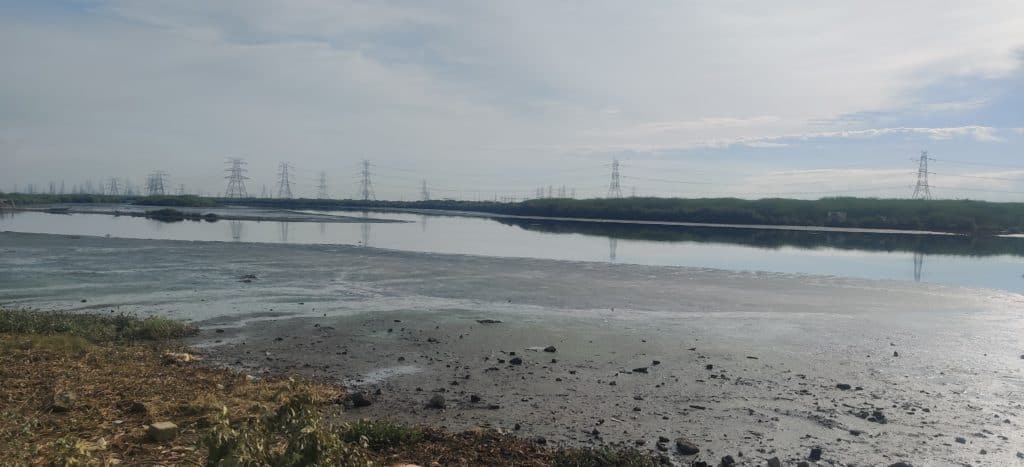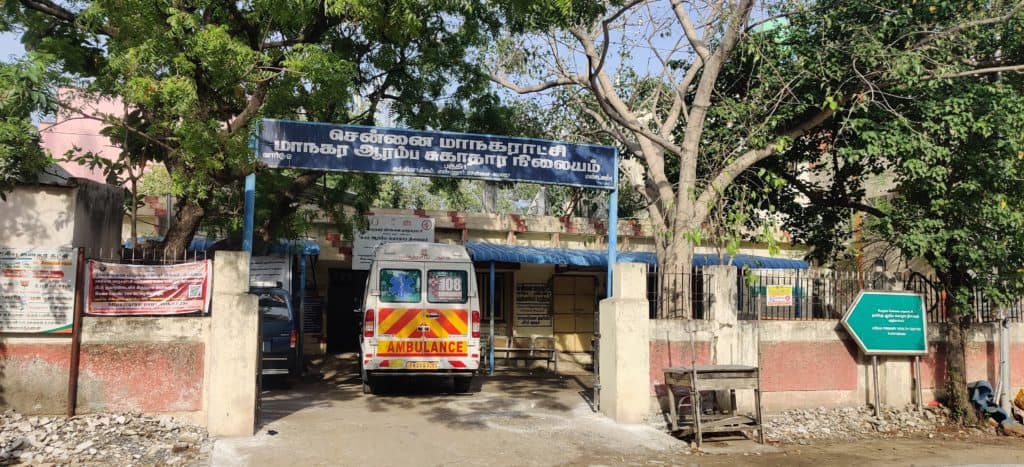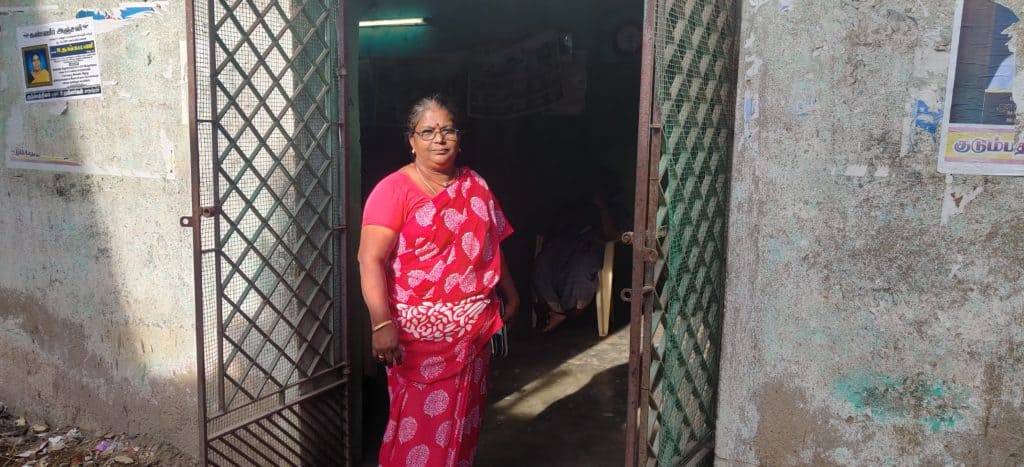Muthulakshmi S, a resident of Kattukuppam village in the Ennore Industrial Cluster spends a good share of her family income on doctors’ fees and medicines. “My kids suffer from severe cold and cough infections every two months. The doctor says that it is common among those living here,” says 27-year-old Muthulakshmi, whose kids are seven and three-and-a-half years old. Her husband is a fisherman who brings home a few hundred rupees on some days, but nothing on many others. Muthulakshmi is not alone, however. Her trials and tribulations reflect those of many women in Ennore, and much of that can be traced in one way or the other to the persistent air and water pollution in the area.
Located in the northern part of Chennai, Ennore Industrial Cluster is home to two functional thermal power stations, ash ponds, two ports, fertiliser manufacturing industries, pharmaceutical companies, oil storage terminals, coal storage yards, foundries, cement manufacturers and construction works.
Bordered by Buckingham canal and Kosasthalaiyar, Kattukuppam village has been transformed from an economically sustainable locale to a polluted industrial area, ever since industrialization started here in the 1970s. The air of Kattukuppam is laden with toxic gases, the walls of the houses in the village are dusty and the once clear waters of Kosasthalaiyar are filled with industrial effluents. Gone are the days when Kosasthalaiyar promised a good catch of prawn and authentic fish. Now filled with fly ash and hot water from the thermal power stations, the polluted river not just deprives fishermen of their livelihoods, but also leads to anxiety, financial stress and other mental health issues among the women in these families.
Muthulakshmi’s constant struggle and mental anguish are clear from her words: “The health of my kids, our financial instability and that I am not able to earn bothers me a lot …We don’t have enough money for medical expenses. Every time we visit a hospital, we have to shell out Rs 500.” There is no healthcare centre in this village.
Broken promises
Muthulakshmi, who had studied till the plus two level at school, is now trying to find a job as a domestic maid, as she feels there is no hope of getting employment in any of the industries here. “They promised to give us jobs, though. Every factory makes such false promises before setting up units in Ennore, so as to avoid opposition from the locals,” she says.
Only a few locals got employment in the industries here, against the latter’s promise of creating wide employment opportunities for the fishermen of the Ennore Industrial Cluster. “If the river was not polluted, at least my husband would have been earning enough from his traditional occupation and we wouldn’t be spending so much money on the hospitals,” she says, “It is the feeling of collective betrayal by the companies and the government that gives me sleepless nights.”
Read more: Ennore backwaters an “environmental crime scene” as fly ash dumping and encroachment continue

The indirect effects of pollution
Dwindling earnings, health hazards and the visible helplessness and psychological stress of the community, especially the women, paint a stark picture of the many ways in which pollution can affect people.
It is not just respiratory issues that trouble them. The sludge-filled Kosasthalaiyar has become a death trap for the fishermen venturing out into the waters. Data is unavailable, but anecdotal evidence hints at many deaths and accidents in the river. “As the sludge-filled Kosasthalai river makes it difficult to row the boats, fishermen physically push them for at least two kilometres in the water. A slight trip and an accidental fall in the sludge, and they suffocate to death. This year, we have had two such deaths,” said Alli Bhai P, a resident of Nettukuppam, adding that such fatalities force the wives of these fishermen to take up low-paying jobs.
Local fisherman, 39-year-old Elangovan R, had to have his leg amputated due to a ‘possible infection.’ “The doctors said that it could have been a worm bite or due to chemical contamination in the river. But never did this happen to anyone before,” says his wife, who is now the breadwinner of the family. The eri (river) has ash prawns from the coal ash habitat and could be a habitat for other poisonous worms too. “No one cared to investigate,” says the woman, who suffers frequent panic attacks these days as a result of the trauma they have gone through.
Of course, the foul-smelling Kosasthalai river and the lack of catch don’t stop the fishermen from going out to the river. But to forget the ordeal of their experience and their frustration, many of them take to drinking. “Alcoholism is common among men here. Many men here have lost their lives to the ill-effects of alcoholism. The burden of the family then falls on the women, who fall back on odd jobs such as selling pickles or working as domestic maids and earn meagre incomes,” says Alli Bhai P.

Read more: How industrialisation has rung the death knell for Ennore’s ecology
Women hit hard
Pollution has had wide implications, particularly for the physical and mental well-being of the women of Ennore, suggests our conversations with five men and five women in the community. While two women complained of recurring Urinary Tract Infections and early menopause, attributed to water pollution in the area, all five of them talk of the children being vulnerable to chronic wheezing, colds and skin allergies. This, they say, leads to to constant anxiety and trauma.
“Women are perpetually worried about the health of their children and husbands, often ignoring their own well-being. They eat less and hesitate to spend money, even to buy necessities, as they feel the pressure of saving every bit for medical expenses. These are the same women who led contented lives in this very area some decades ago,” says V Devanayiki, a former councillor of Nettukuppam village.
If pollution is responsible for chronic ill-health among residents in the Ennore Industrial Cluster, the utter inadequacy and poor quality of healthcare services add to the burden. The pregnancy care hospital has been turned into a revenue office in Kattukuppam; the nearest government hospital for Urnamedu (another fishing village in Ennore Industrial Cluster) residents is 15-20 km away and there is no Primary Health Centre in many villages, including Kattupalli Kuppam. Urnamedu residents have to commute a distance of at least 4 km to even reach the bus stop.
Lack of public health care pushes citizens to opt for private hospitals. “The women of Ennore prioritise the illnesses of their kids and husbands, ignoring their own. It is simply because private hospitals are unaffordable and government hospitals are inaccessible,” says Dr Vishvaja Sambath, Public Health Researcher, Healthy Energy Initiative.
What do the women of Ennore want?

Environmentalists suggest complete restoration of the Ennore Industrial Cluster to save the lives and livelihoods of these fishermen. “Rampant industrialisation, unregulated and unmonitored emissions from these industries in the Ennore region have resulted in poor quality of living for these residents. In order to ensure their well being and improve public health in the locality, the toxic coal fly ash mess should be cleaned up and the creek must be restored completely. In addition to the creek restoration, stringent monitoring and regulatory mechanisms should be implemented to take immediate measures against violating industries,” says Vishvaja.
But ask the women of Ennore and it appears that they are now even more worried about how to make ends meet. Women of the community are pressing the state government for immediate interventions to ensure financial stability for their families. Witnessing the deterioration of their quality of life, they are eager to contribute to the economic upliftment of their families. But a majority of them do not have the educational qualifications or skills needed to find secure employment. “The situation was quite different five years ago. The women here used to sell the fish and make enough money. Now that the catch is bad, they are all jobless,” says V Devanayaki.
The clarion call to the corporates and the thermal power stations is to upskill them. “Our husbands should get the promised jobs. We should be trained and given jobs,” says Hema Lakshmi, a fisherwoman. Assurance of permanent jobs and a steady source of income for locals remain a mirage — false promises made by the corporates to prevent hostility from the former. Many corporations including L&T and North Chennai Thermal Power Station employed some locals on a contract basis. “A decade ago, L&T said they would, in time, make our jobs permanent. They never did,” says an employee, seeking anonymity.
**Errata: Some quotes and inputs from the first published version have been removed in view of requests to maintain privacy.